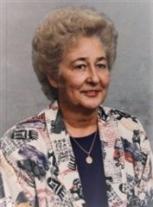BCG to host Joy Reisinger Lecture Series: Six Free Webinars on 7 October 2022
-
Created on 03 March 2022
7 October 2022 starting at 9:00 a.m. MDT (11:00 a.m. Eastern, 4:00 pm GMT)
Joy Reisinger
The Board for Certification of Genealogists (BCG) will host six live webinars, free and available to the public, as this year’s Reisinger Memorial Lecture Series on 7 October 2022. The hour-long webinars begin at 9:00 a.m. MDT (11:00 a.m. EDT and 4:00 p.m. GMT) and continue throughout the day. Six leading genealogists will speak on topics related to the Genealogical Proof Standard, solving genealogical problems by discovering and using a wide variety of appropriate sources, and immigration. The webinars are part of the Joy Reisinger Memorial Lecture Series and are presented in conjunction with Legacy Family Tree Webinars.
The lecture series is presented annually in memory of BCG’s former trustee and vice president, Joy Reisinger, who began this lecture series for Family History Library staff during BCG’s fall board meetings. Joy was an advocate for open records access, a lecturer on research methods, and an expert on Canadian resources, especially those of Quebec.
The schedule for the lectures is:
9 a.m. MDT. "When Wrong is Actually Right: Constructing Proof Arguments for Counterintuitive Conflicts," Meryl Schumacker, CG®
Name changes, enumerator errors, and terrible informants can combine to create major inconsistencies in documentation. Records that, at first glance, appear to be major mismatches can later turn out to be correct. Researching non-English-speaking immigrant families requires a comfort level with these layered conflicts-upon-conflicts. This session demonstrates how to use logic to confirm that a wrong-name, wrong-age, wrong-everything record can actually be right, with an emphasis on immigrant families. Participants will learn how to transfer that logic to a written proof argument.
10:15 a.m. MDT. "Peeling the Onion: Getting to the Original Sources," Gary Ball-Kilbourne, CG®
Genealogy Standards 38 and 58 strongly express a preference for using original sources. Diligent researching and a few tricks of the trade enable genealogists to find original sources that underlie authored narratives and derivative sources.
11:30 a.m. MDT. "The Hub of the Wheel: How Tracing a Brother with no Children Connected Ten Siblings," Mary Kircher Roddy, CG®
A family from Ireland emigrated in a chain migration scheme to western Pennsylvania between 1825 and 1845. See how using the standards for researching connected the siblings and their descendants and led to their origins in County Tyrone.
1:30 p.m. MDT. "Consult via…Explore with…Discover through…Literature Reviews," Jan Joyce, CG®, CGL℠
What if you could consult with genealogical experts each time your work slows? Together you could explore options for new paths of discovery. The right approach to a literature review allows you to do that. Other experts have encountered the same challenges that you do, and they have written about them even if not overtly. These challenges could range from beginning work in a new geography to parrying with a difficult brick wall. Learn how to conduct a targeted literature review, cull the information you need, and advance your research. A case study on use of negative evidence will highlight the methodology.
2:45 p.m. MDT. "Finding Henrietta: Reconciling Conflicting Evidence to Reveal a Woman’s Identity," Nicole Gilkison LaRue, CG®
Henrietta Dixon was never enumerated with individuals identified as her parents in a federal census. Records revealing her family members, including her father, are often conflicting and open up new questions. Additionally, multiple marriages further obscure her identity. This case study uncovers Henrietta's maiden name and emphasizes the importance of a focused research question when attempting to meet the Genealogical Proof Standard.
4:00 p.m. MDT. "Hidden Stories: Using Analysis to Explore the Unexpected in Family History Research" Jennifer Zinck, CG®
Tales of illegitimacy, divorce, and desertion aren't limited to soap operas and modern reality television. Discovering trails that lead to unanticipated events can be shocking, confusing, and exciting all at the same time. This session will explore how genealogists can utilize the law, conflict resolution, and tools like date calculators and timelines to help build a clearer understanding of some potentially challenging historical situations.
The words Certified Genealogist and its acronym, CG, are registered certification marks, and the designations Certified Genealogical Lecturer and its acronym, CGL, are service marks of the Board for Certification of Genealogists®, used under license by board certificants after periodic evaluation.
